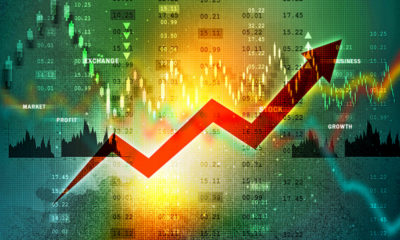Bonds
This Indicator Tells Us Bear Market On The Horizon
Last week marks the release of the WLI (Weekly Leading Index) from the European Cycle Research Institute (ECRI) covering the week beginning April 15, 2016 and ending April 22nd, 2016. The data reveals the index is up 1 point – from 134.2 since last publication.
With a year-on-year level currently set at 0.75%, rising 0.22 percentage points from last week's numbers. ECRI's WLIG (Weekly annualized growth indicators) are now at 3.5, down from a low in January 2015 of -4.7.
These latest figures mark a period of consecutive growth for the fourth week in a row for the index, and a recently marked departure in affairs to the trendline, after an uber-bearish period of the index recorded nearly 9 months of consecutive lulls and negative growth.
About ECRI and it's Flagship Weekly Leading Index
ECRI is a research center set up by various EU credit institutions in conjunction with the Centre for European policy studies. Its main goal is is to research trends and cycles in the market, and to identify the implications of actions relating to the credit market, and on a broader level their impact to the macro and micro economic markets.
They are perhaps most well known for their free and publicly available Weekly Leading Index, which is released as the name implies once a week. The index is proprietary, having never been fully disclosed or reverse engineered. However we know it is influenced by and comprised of some known and some unknown external elements; including but not limited to:
- The Housing market
- Unemployment rates
- Jobless claims
- Mortgage applications
- Stock prices
- Bond Yields & Bond supply
- Current money supply
Why the ECRI believes it's indexes are significant
Researchers at ECRI believe that periods of discernible low growth represented in their indexes make it far more likely the growth rate will then face a likelihood of adopting a negative trendline.
From that point, they infer that prolonged and persistent periods of economic downturn visible in the indexes can often be an early signal that the markets, just like a house of cards are in a vulnerable state- teetering on the brink of collapse- . The slightest rampant movement can send the whole thing toppling. Ultimately ECRI's advises investors to be cautious for the increased propensity of such an event to unfold at these key times.
Big trouble in little S&P – why the WLI downtrend could be predicting an end to the bull market.
As has been mentioned above, although last months index picked up slightly the overall trend for the prior 37 weeks has been overwhelmingly gloomy, painting the primary stock market ripe for a possible decline.
Over the last quarter century the ECRI, using indexes like WLI have had a measurable success when it comes to recognizing patterns in the market and pre-preemptively identifying imminent collapses or prolonged stagnation in the market's growth.
Whilst certain entities have continued adopting an uber-bullish stance trumpeting continual growth, the ECRI's indexes have successfully earmarked events leading to some of the markets biggest recessions: 1990, 2001 and 2008 being notable examples of crashes foreshadowed by severe and persisting negative movement in the companies’ indexes.
[buffet_recommended]
Of course Obviously, these indications are not an exact science, and there are many external factors that could ultimately trigger something as severe as another financial meltdown that isn't picked up correctly in advance by the index.
The ECRI asserts that based on historical data, A prolonged period of slowdown represented in the index has a more than 50% chance of resulting in a full blown recession.
Without making any predictions, It's clear that certain parallels can be drawn to the slowdown of the Leading Index today and the dot com crash of the 90's, at least in terms of cyclical swings across many separate indexes
Should market participants start preparing to Grin and Bear it ?
Another important fact to note is that we are now in the midst of the second longest bull market since records began, having recently surpassed the previous second place record held from a full 60 years ago.
The first sustained bull market occurred during the years 1990 to 2000 while the third longest lasted from 1949 to 1958. A major economic downturn in the shape of the dotcom bubble's bursting and the Eisenhower Recession proceeded the end of both bull runs. This leads some speculators to adopt a bearish outlook and champion the prediction that when the matador shows up, we might well be in for a bumpy ride.
It's important to understand that the WLI is just one indicator of many, and there will always be bulls touting sanguine predictions loudly, just as there are doom sayers touting financial meltdown from the rooftops.
Savvy investors should always rely on multiple supplements in their decision-making criteria, and be sure to factor in several sources when it comes to making sense of the markets directions. We should realize that while it's possible to predict things to a degree algorithmically nothing short of a crystal ball will give you infallible results.













